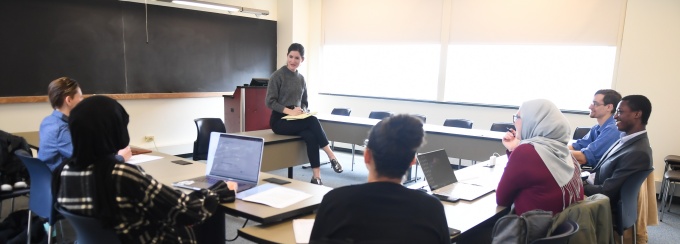
Clinic Director Alexandra Harrington with students from the Criminal Justice Advocacy Clinic.
Criminal Justice Advocacy Clinic
The Criminal Justice Advocacy Clinic provides students with an opportunity to represent incarcerated individuals in second-look proceedings and to advocate for criminal system reforms in New York State.
The clinic serves to expand criminal defense and reform capacity in Western New York. Student attorneys in the Criminal Justice Advocacy Clinic will take the lead on client casework on behalf of incarcerated individuals, in addition to policy advocacy.
Student attorneys represent incarcerated individuals in second-look proceedings. For their first semester, students will represent clients seeking resentencing under the 2019 Domestic Violence Survivors Justice Act, preparing for hearings before the Board of Parole, or appealing parole or resentencing denials. Student attorneys will be assigned a client and will work on preparing their clients’ resentencing applications, parole packet, or appeal, as well as exploring other avenues of relief. Student attorneys will also work on a policy advocacy matter. Clinic work will involve visiting clients incarcerated in New York correctional facilities. Clinic students must have availability on Fridays to visit with clients.

Alexandra Harrington
Director of the Criminal Justice Advocacy Clinic; Director of the Innocence and Justice Project; Associate Professor
Clinical Legal Education

Annabel Mireles
Clinical Adjunct Faculty/Staff Attorney
Clinical Legal Education

Jerome Wright
Parole Reform Consultant
Clinical Legal Education
507 O'Brian Hall
Phone: 716-645-2167

Carmen Cong
Social Work Consultant
Clinical Legal Education
507 O'Brian Hall
Phone: 716-645-2167

Lila Rollo
Social Work Consultant
Clinical Legal Education
507 O'Brian Hall
Phone: 716-645-2167

This is a year-long clinic. Students are enrolled for four credits in the first semester and three credits in the second semester. Students may choose to enroll for additional semesters with permission of the instructor. Students meet twice weekly for scheduled seminars in addition to weekly team supervisions with the clinical professor to discuss their case work. Students also engage in intensive fieldwork outside of class time. A large portion of this time includes visiting incarcerated clients at prisons in Western and Upstate New York. Clinic work also involves interviews with clients, clients’ family members, witnesses, attorneys, and community organizations; researching legal issues that arise in the client’s case; drafting correspondence; conducting investigations and discovery; reviewing case records; writing legal briefs or other advocacy documents; and—depending on the stage of the case—arguing your client’s case in court.
Students will work in teams of two or more, and some projects may allow for collaboration with students from other law schools’ clinics. Student attorneys are expected to take the lead on their cases, under the supervision of the clinical professor. Student attorneys will learn to build client relationships; interview witnesses; conduct investigation; develop mitigation evidence; work with experts; and engage in oral and written advocacy before the courts, parole boards, and legislature.
The Innocence and Justice Project (IJP), housed within University at Buffalo School of Law’s Advocacy Institute, combines strategic litigation and client service to address the problems of over-incarceration and racial injustice in the criminal justice system.
The Project was originally launched in late 2015 by adjunct professor John Nuchereno, but went on hiatus following his untimely death. It was revitalized in 2020, when Professor Harrington became Director of the Project. In consultation with the Director of the Advocacy Institute, Anthony O’Rourke, Professor Harrington expanded the scope of the IJP’s mission beyond wrongful convictions to recognize that people, including those who commit violent crimes, ought not be condemned to life in prison.
Through the Criminal Justice Advocacy Clinic, the IJP litigates second-look cases like resentencing applications under the Domestic Violence Survivors Justice Act, parole appeals, and clemency petitions. Students in the Clinic also implement the mission of the IJP through advocacy for statewide parole and resentencing reforms to increase and make more meaningful the few existing mechanisms for release from prison.